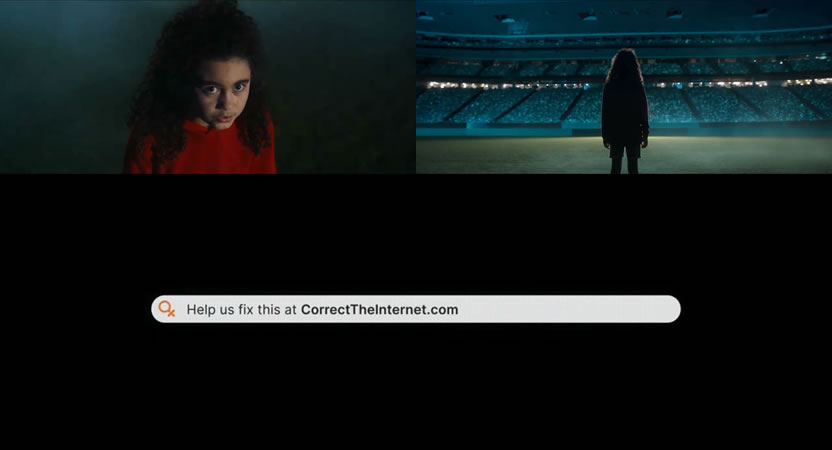Premieres – International

(01/24/23). The New Zealand office of the DDB agency launched a global campaign to fix the internet and make athletes more visible. Who has scored the most goals in international football? The internet usually says it’s Cristiano Ronaldo, but it’s actually Christine Sinclair, a female soccer player.
The search data inconsistency is behind a global campaign launched on Saturday (January 21, 2023) to injure female athletes. “Correct the Internet” is a collaborative effort
From a like-minded international group trying to highlight and correct errors in internet search results, female athletes should be seen more as a result.
One of its founding partners is Rebecca Soudon, a former New Zealand women’s soccer player and owner of international women’s sports marketing and sponsorship consultancy, Team Heroine, who is a member of United Nations Soccer for Goals.
Rebecca Southen says she is passionate about helping the world recognize all athletes and empowering the next generation of athletes. “Many of the world’s best athletes are women. Many of the world’s sporting achievements are held by women. But when searching online for actual sports information about athletes, the results tend to favor male athletes, even though female athletes are more prevalent.
Statistics,” says Soughton.
Paul Spain, Futurist and CEO of Gorilla Technology, says: “Search engine algorithms are designed to deliver what we’re looking for instantly, drawn on human-generated content. Because search engines pay close attention to what major publishers, social media platforms, and content creators are doing, search results can reflect the intrinsic preferences of specific individuals or organizations. This can lead to biased search results.
The campaign has also received support from a number of famous athletes and major sports organisations, including England Red Roses rugby player Shaunagh Brown and New Zealand footballer Mykayla Moore. W?hine H?kinakina or Aotearoa (WISPA), Women’s Sport Australia and New Zealand Football.
Shaunagh Brown said: “The only way to get the algorithm right is people power and the internet wants to empower people to ensure that information is delivered to all of us. Let’s do this for future athletes around the world.”
This is an opinion shared by Meikayla Moore: “This campaign is predicated on correcting and highlighting false investigative facts that are consistently and inaccurately detrimental to female athletes in everything, rather than pitting women against men”.
“I feel it’s important not only for those who have achieved these incredible statistics, but also for everyone who sees such brilliance. Women are heroes, let’s recognize them for it, eliminate learned biases, empower and inspire the next generation.”
With the goal of empowering women through the power of sport, Correct the Internet received support from Football for Football (FFTG), a United Nations initiative that provides a platform for the global football community to engage and advocate for the Sustainable Development Goals (SDGs). ), target 5 Its goal is to achieve gender equality and empower all women and girls.
Maher Nasser, director of the Outreach Division of the Department of Global Affairs at UN Communications, says: “With increasing reliance on internet search engines to find information, algorithms assume that conscious and unconscious human biases enhance the natural order and outcomes. Accordingly, gender equality begins with acknowledging the biases and challenges faced by women and girls and Campaigns like Fix the Internet are a great way to expose how the same biases have entered the virtual world”.
The women at Sport Atoroa have also joined the struggle. Interim Executive Director, Nicky Vane
den Bos said: “There couldn’t be a better time for this campaign, with the women’s game featuring the ICC Women’s Cricket World Cup, the New Zealand team at last year’s Rugby World Cup and the FIFA Women’s World Cup. New Zealand means that internet searches are always on, ensuring that the results reflect the facts. Let’s make sure, not historical bias.”
Rebecca Sowden said: “As the internet has learned our biases, so have its many search engines
The results are inconsistent, often favoring men, and change depending on who you’re looking for. When women are the best in the world, our goal is to empower the next generation of athletes by making sure the internet reflects that.
There is no easy way to correct discrepancies in search results. However, if people
Please report these issues using each search engine’s built-in feedback feature
Recorded and organized. The problem is that most people aren’t aware of the feedback feature, and recent design changes in some major search engines make it difficult to find. The team behind Correct the Internet has already identified several facts
Contradictions and has developed a tool that makes it easy for anyone to run comments with just a few clicks.
The tool is hosted on the Internet. The public can visit the site to send feedback to search engines to report their wrong search results and provide correct information. Over time, the goal is to use the combined power of this tool and people to find and fix as many search result errors as possible.
OK Internet officially launched on Saturday, January 21, with the NZ Football Ferns taking on the US Women’s team at Eden Park with the following fixture.
* You can view the project here: www.correcttheinternet.com
+ Information about the presentation of the “Fixing the Internet” project Here.
Fix the internet. Promoter: Fix the internet. Brand: Fix the Internet – Help us fix this. Product: sariinternet.com Advertising agency: DDB New Zealand. Country: International. Category: Institutional and corporate image. Endorsements and Endorsements.

“Typical beer advocate. Future teen idol. Unapologetic tv practitioner. Music trailblazer.”
